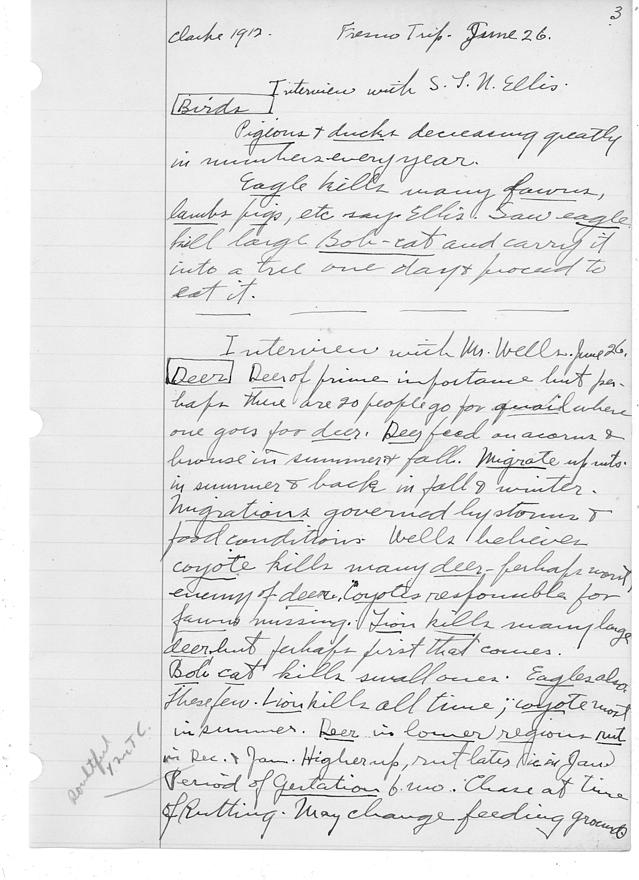Written by Chris Gordon
Graduate Intern at Simmons College
Master’s in Library and Information Science/Archives
This semester I had the privilege of working with the Frank C. Clarke field notes and correspondence spanning a relationship with Grinnell and the MVZ of nearly four decades. The correspondence and field notes begin almost simultaneously in 1911 and 1912 and while the field expeditions only last a year, Clarke continued to provide specimens and converse with Grinnell and MVZ staff via his letters until 1934.
Clarke conducted his fieldwork in a unique way, relying on informal interviews of  residents and visitors to his survey areas. Much of his notes are spent relaying conversations with hunters, forest rangers and taxidermists regarding deer populations, Clarke’s field surveys were primarily conducted as deer investigations. Rather than just notes on deer species, Clarke’s interviews range across all aspects of deer life from notes on predators to the effectiveness of hunting laws. Clarke’s method of conducting his surveys gives much insight into Clarke as a person as he often adds his own opinions along with the opinions of his interviewees. Clarke had some strong opinions on government control of predators and mentions offering bounties on things like mountain lions or coyotes a few times. I didn’t expect to see so much of a personal voice in a wildlife survey and the instances where he did offer his opinion stood out.
residents and visitors to his survey areas. Much of his notes are spent relaying conversations with hunters, forest rangers and taxidermists regarding deer populations, Clarke’s field surveys were primarily conducted as deer investigations. Rather than just notes on deer species, Clarke’s interviews range across all aspects of deer life from notes on predators to the effectiveness of hunting laws. Clarke’s method of conducting his surveys gives much insight into Clarke as a person as he often adds his own opinions along with the opinions of his interviewees. Clarke had some strong opinions on government control of predators and mentions offering bounties on things like mountain lions or coyotes a few times. I didn’t expect to see so much of a personal voice in a wildlife survey and the instances where he did offer his opinion stood out.
While most of Clarke’s notes fall under deer investigations, he ends his field notes with an investigation into a population of sick ducks on Tulare Lake. Rather than simply recording his observations, Clarke initiated a series of experiments in an attempt to find the origin of the sickness. A great window into Clarke’s scientific method, I could follow his train of thought as he compiled his initial research before moving into the proper experiments. He even had healthy ducks sent in from Hayward to keep his experiments as controlled as possible. The entire section surprised me both for being so unlike his earlier fieldwork and also for diverging from my own preconceived notion of what a wildlife survey consists of.
His correspondence I found even more fascinating for the small insights they gave into Clarke and Grinnell’s friendship. Most of the letters in the collection are strictly business involving Clarke sending animal specimens into the MVZ and Grinnell sending his confirmation on receipt. But a few times they went beyond their usual businesslike manner and some personality shines through. In one instance Clarke sends a specimen of a mole and Grinnell responds by saying “A mole burrowed its way into the Museum this morning—I guess by the postal route”. After reading through dozens of more impersonal correspondence, coming across the little joke had me almost laughing out loud for its unexpectedness. Here I was expecting to read through letters cataloging a specimen donation list and I get a little Grinnell stand up. It’s nice to think that Clarke at his family farm and Grinnell at the MVZ, separated by many miles, still get the experience of a couple of colleagues, sharing a laugh over the proverbial water cooler.
The completed Inventory to the field notes of Frank C. Clarke now available on the Online Archive of California
